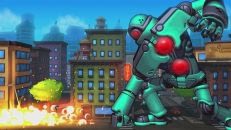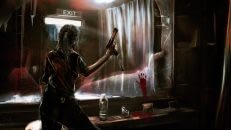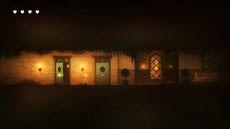Biblioteca Review – This Dull House
There have been many really great narrative/puzzle-based horror games made with RPG Maker. Yume Nikki, Ib, and The Witch’s House have all surprised players with how frightening they can be despite simple graphics and interfaces, using atmosphere, sound, and surprise to send players quivering. Vitaly Margevich’s Biblioteca hopes to join such titles with its own blend of story, puzzles, and horror, but unfortunately falls short of finding a seat with such great titles. With a weak story, uninteresting and potentially broken puzzles, and a general lack of polish, the game just does not stand up compared to other free titles.
The game’s look is quite basic, not unlike many other games of this style. The main character, Louisa, looks like she’s an NPC straight out of some old RPG. The other characters bear similarities to other RPG Maker games, all with the same odd body shapes and faces with only eyes. The house is as plain as could be as well, showing only the occasional splatter of blood to indicate something important. A handful of monsters do their best to make the game’s visuals stand out a bit, but look more like blobs of dark colors than any particular creature. You understand that they’re monsters because they chase you, but nothing in their haphazard design indicates it.
Darkness has been a popular way to scare people in almost any horror game, and Biblioteca does use limited lighting. The issue is that you can see absolutely everything in the game outside of the circle of light around your character. It’s just slightly darker outside of it, so the light doesn’t really seem to accomplish anything. You could argue that it’s a neat little visual effect, but it just makes this weird black circle around the character that just looks strange and out-of-place.
Graphics aren’t necessarily a deal-breaker in these games, though, as they can get away with just having a good atmosphere. Biblioteca pulls off a little atmosphere using sound, with a few screams punctuating some decent jump scares. The game did manage to get the drop on me a few times, although most of the time there is very little going on. The game has nearly non-existent music, playing some lackluster tunes as you explore the simple mansion and its underground dungeons. Music is often the best way to make up for graphical limitations in a horror game, but the music here does little to boost the mood. It’s rarely even audible or there at all, and while silence works when you build up some atmosphere, it’s useless before that point.
When graphics and music lack in a horror game, a good story can jump in to save the day. Unfortunately, Biblioteca doesn’t have that either, telling a simple tale of a girl having nightmares of an evil place and then going to that place. Nothing shocking or particularly complex happens, and the story is pretty straightforward fare. It’s a bad place where a bad person lived, and that’s just about it. The story also rarely informs events, feeling disconnected from the gameplay. Yes, you’re in this place because of the story, but the puzzles and items seem to have no connection with an overarching narrative. You collect items because that’s what you do in a haunted house video game.
I’m aware that English isn’t Margevich’s native language, but the typos in the text don’t help an already weak storyline. I can accept that it’s not always easy to put out an English game when it’s not your first language, but if you’re going to charge people money for something then you need to have it proofread by someone. It doesn’t help that the game is already doing little to maintain mood and immersion, so seeing simple words misspelled constantly breaks my already-tenuous connection with the game even further.
The puzzles, which can be pretty hard in games like this, are all over the place in terms of challenge. It tended to fall into old school point-and-click territory, where it was just easier to use random items on random things until the game let you progress. There are many items in the environment that you can interact with and pick up, assigning the stuff you grab to numerical keys. Equipping the item is as easy as hitting the right number key and then trying to interact with something, so even if you’re trying to brute force a puzzle, at least it can be done quickly with the small handful of items you’re given. Most of the time, clicking around and trying everything is pretty fast, and the best way to go. This is especially true when you’re being chased. If in doubt, click constantly.
Beyond that, there are some puzzles that simply seem to be broken or overly-fussy. It took an exceptionally long time to find the fifth item in a series of items I needed during the game’s fourth act, meaning I spent most of my entire play time clicking on tiles and messing with objects in a single series of halls. There was no clue what to do there and no secret text to guide me, so it was literally just brainless clicking while looking for a solution. Margevich does some interesting things with sites outside of the game at one point to create a more unique puzzle, but doing so really just involved following instructions, and even then, I had no idea what to do with the information given. I understand that games of this style have bizarre puzzle solutions at times, but it felt like Biblioteca bounced between overly easy and incomprehensible, with nothing in between.
These puzzles are sometimes made more complex by the presence of the weird ghost creatures. If they make contact with you, you lose the game, but can choose to restart one of the chapters from the main menu. The chapters are really short, at most two to five minutes if you know what you’re doing, so it’s not a big deal, but often you have to ditch these things in really narrow hallways. Thankfully, the game often increases your walking speed when they’re around, so it’s usually easy to outrun them if you wait for the right opportunity.
Another thing that compounds difficulty with puzzles is that some of the doors, notes, and items simply don’t react when you click on them. Early on, most items react in some way when you click, so you learn to look for these items to solve puzzles. Later on, things like doors, notes, and other objects give no reaction when you try to interact with them. It’s misleading to the player at best, and potentially broken at worst. I’m not sure which it was, but I often felt like the game wasn’t responding when I’d see a blood-splattered note on a wall, something the developer is clearly trying to draw my eye to, only to find I can’t interact with it in any way. If that also happens to be in one of the puzzles I’m having trouble solving, it makes an irritating situation all the more frustrating.
If you feel like I’m being a little hard on a $2 game, I want you to note that some of the examples I listed before, which are all great games, are completely free. Some of the neatest horror games I’ve ever played are all polished with excellent, complex puzzles and creepy, twisted storylines. They are great games that I would happily pay for, and yet are all available for free. Biblioteca shows little of the polish, deft storytelling, or capability for atmosphere that those titles do, yet costs money to play. I have no problem with a dev charging money for their work, but I find it very hard to recommend a game with this many issues over the free, superior games that are available to download.
Biblioteca has the framework of these games down, but lacks the polish and detail that the better, free games do. I like the idea of going outside the game to solve puzzles, and I’m always game to crawl through a creepy mansion in the dark and run from monsters, but there are just too many alternatives out there for me to recommend it. I still think Margevich is onto something interesting with the concept and some of his ideas here, but I’ll just have to wait and hope that his next title is better than this one.
Biblioteca is available for $1.99 on Desura. For more information on Vitaly Margevich and his work, you can go to his website or follow him on Twitter.






